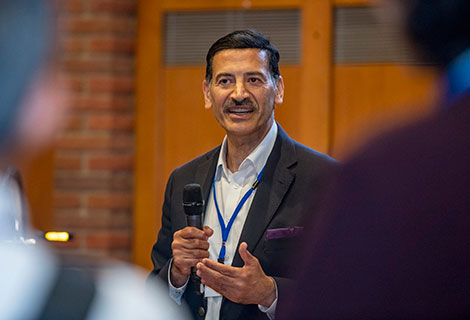Three members of Electronics and Computer Science (ECS) have been recognised for their research potential by being awarded roles in The Alan Turing Institute – the UK’s national institute for data science and artificial intelligence.
PhD student Joseph Early is the first Southampton student to be selected as a Turing Doctoral Student, while Dr Adriane Chapman and Professor Neil White, Directors of the Centre for Health Technologies, have been named as Turing Fellows with pilot projects.
The University is a partner of The Alan Turing Institute that aims to undertake world-class research in data science and artificial intelligence, by applying its research to real-world problems, driving economic impact and societal good, leading the training of a new generation of scientists, and shaping the public conversation around data.
Southampton Turing Fellows and Doctoral Students work alongside other Turing university, industry, government and third sector partners to spearhead cutting-edge research to real-world problems creating lasting effects for science, society and the world we live in.
Joseph Early will focus on ‘explainable artificial intelligence’ (AI), examining how AI systems work and aiming to increase trust in these systems and ensure they are fair and unbiased.
He completed his undergraduate and postgraduate degrees at Southampton and will carry out his research under the supervision of Southampton’s Sarvapali (Gopal) Ramchurn, Professor of Machine Intelligence and Director of the Centre for Machine Intelligence, who is also a Turing Fellow with a pilot project.
Joseph said: “It is a real privilege to be selected as a Turing Doctoral Student and I am proud to be representing Southampton at the Turing. My project aims to allow AI systems to be used in domains that require high levels of performance and trust, such as medicine.
“The best thing about being part of the Turing is the opportunity for collaboration. I am already collaborating with another Turing PhD student, and I plan to expand this further within my student cohort and with researchers in the wider Turing community.
“I see myself as the link between doctoral students at Southampton and at the Turing, encouraging collaboration between people who have similar research ideas. I also aim to bring advice back from the additional training that I receive at the Turing, and make my Southampton colleagues aware of relevant events at the Turing.”
Dr Adriane Chapman will collaborate with the University of Manchester to investigate how to improve data sharing, such as for medical research, by automatically determining the type of anonymisation techniques that should be applied for best privacy protection.
She said: “I am thrilled to be named as a Turing Fellow with a pilot project. At the Turing you are surrounded by some of the most interesting people. It is a wonderfully collaborative and supportive environment and the ideas fly.
“Data containing personal information needs to be anonymised before it can be shared but, unfortunately, all anonymisation techniques are breakable. Which anonymisation technique should be applied depends on the context or data environment in which the data is originally collected, as well as the data environment in which it will be shared.
“My project will be the first study to explore how provenance (the history of data) can be used to automatically detect these data environments so that the appropriate technique can be chosen. Currently this is done by a human, which due to the potential for error and conservative estimation, means the data is not always shared as it could be.
“Our research will lay the groundwork for better and more complete data-sharing among organisations while still protecting personal information, and complements the Turing’s research challenge area in cybersecurity.”
Professor Neil White will explore the design of machine learning models to reduce the pressure on hospital emergency departments (ED) by improving patient flow and reducing delays in care. The project has resulted from collaboration with the IT Innovation Centre, who will be applying their expertise in the area of machine learning in healthcare to tackle the problem along with clinicians and data scientists at the University Hospital Southampton NHS Foundation Trust.
He said: “EDs are facing unprecedented levels of overcrowding that lead to increased delays and the only way to minimise these delays, in the absence of being able to increase the size of the ED or the number of clinical staff, is to use available resources more efficiently. We will be taking data collected by EDs to develop probabilistic machine learning models to predict patient outcomes as early as possible, potentially enabling more efficient running of EDs and the hospitals they admit patients to.
“By successfully demonstrating these patient outcome prediction models, we will be able to apply for addition funding to implement the developed prediction tools into front line clinical practice.
“The Turing Fellowship provides a great opportunity to work alongside other researchers who can make a significant impact in the healthcare arena through the use of machine learning methods.”
